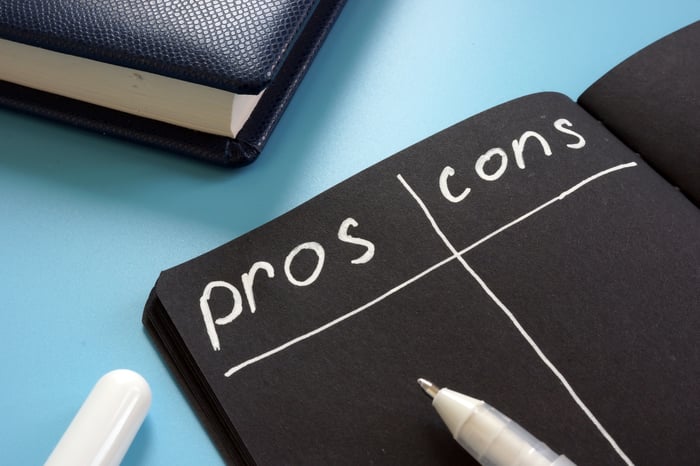Berkshire Hathaway (BRK.A -0.76%) (BRK.B -0.69%) is one of the most famous companies in modern history. If you had invested $1,000 in the stock at the turn of the century, it would be worth $9,800 today, well more than the roughly $5,000 -- assuming you reinvested the dividends -- that an investment in the S&P 500 Index would have grown to. Given that backdrop, it's understandable that a lot of investors want to own the shares. But there are a few things you need to understand if you do decide to buy it.
1. Berkshire Hathaway's CEO is famous
Berkshire Hathaway and its CEO, Warren Buffett, are practically synonymous. He has run the company for decades, using a unique management style. In fact, he's more of an investor than a chief executive, having been trained by Wall Street legends like Philip Fisher and Benjamin Graham. With Berkshire Hathaway he's actually created a holding company, which means it's a company that owns other companies.

Image source: Getty Images.
Like an investor, Buffett largely allows the CEOs of the companies Berkshire Hathaway owns to run the businesses they head with little interference. He checks in regularly and only gets involved if there's a good reason to do so. Normally he doesn't have to do anything but keep tabs on the business' progress. Berkshire Hathaway owns businesses as far ranging as those dealing in insurance, paint, furniture, trains, and utilities. There's a lot going on here.
On top of that, Berkshire Hathaway also owns a portfolio of stocks. These securities largely reside within the insurance business, which uses customer premiums to invest. That's normal in the insurance world, but Berkshire Hathaway's portfolio is large and gets a lot of attention. At least part of that comes from the fact that Buffett plays a role in picking the stocks. At this point there are other employees that help out, given Buffett's age of 93. Notably, his longtime business partner, Charlie Munger, recently died at age 99.
BRK.A Total Return Level data by YCharts
The big takeaway here is that Buffett created a unique entity in Berkshire Hathaway. It reflects his beliefs and approach. At some point, probably sooner rather than later, there will be a changing of the guard. Investors need to be prepared for that and monitor the succession plans and activity carefully to ensure the company doesn't materially change from what it is today. If it does, you may end up owning something you weren't counting on owning.
2. Berkshire Hathaway is cash rich and hoarding it
At the end of the third quarter of 2023, Berkshire Hathaway had $30.8 billion of cash on its balance sheet. It also had $126.4 billion in Treasuries, which would be easily convertible into cash. That's a huge amount of cash. Some investors might argue that this is shareholder money and it should be paid out as dividends, but Buffett doesn't believe in paying dividends -- though he doesn't mind collecting them. If you're an income investor, you'll want to pass on Berkshire Hathaway, at least for now.
Buffett prefers to hoard the company's cash as he looks for new investments. That can take the form of buying parts of public companies or buying entire companies to add to the holding company's already broad collection of businesses. The big takeaway here is that if you buy Berkshire Hathaway, you're trusting the company to use all of this cash in a way that is shareholder friendly. With Buffett at the helm, that has been a wise choice to make. But it won't always be the case, which is why succession issues are increasingly important. In the wrong hands, that cash could quickly be wasted.
3. Berkshire Hathaway needs big investments
Buffett doesn't keep so much cash around because he likes to swim in gold coins like Scrooge McDuck. With more than a $780 billion market cap, Berkshire Hathaway needs to make big investments to move the needle on the top and bottom lines. As noted, the company frequently buys entire companies. Sometimes they're modestly sized, and sometimes they're huge. As an example, the company announced in 2009 that it would pay $26 billion to buy out the shares of train company Burlington Northern Santa Fe (BNSF) that it didn't already own. That amounts to around a fifth of the cash Berkshire Hathaway currently has on its balance sheet. Big moves require big money.
Buffett is very selective in his acquisition targets, so there's no way to know what he'll buy, or when. And he'd rather sit on cash than invest it in a slipshod manner. But if you own the company, you'll want to be prepared to see a large acquisition, or even a string of them over time, as that cash gets put to work. But one thing that's notable about the BNSF purchase is the timing, which was right at the end of the Great Recession. Indeed, you might find that Berkshire Hathaway uses its impressive financial foundation to step in when everyone else on Wall Street is running scared. History shows that this approach has worked out well for shareholders, but such contrarian moves can be jarring if you aren't ready for them.
Berkshire Hathaway is not your typical investment
In some ways, Berkshire Hathaway is like a mutual fund or even a hedge fund. What it most certainly isn't is a typical company. Buffett's unique approach has influenced the company in dramatic ways, most of which have been good for investors. But you'll need to either close your eyes and trust that he's operating in your best interest or dig in deep to understand and track the company if you buy it. If you go with the second option, you'll probably find you have a lot of work ahead of you, given the diversity of businesses Berkshire Hathaway owns. And then you need to consider what happens when Buffett is no longer the person in charge, because that day is approaching.






